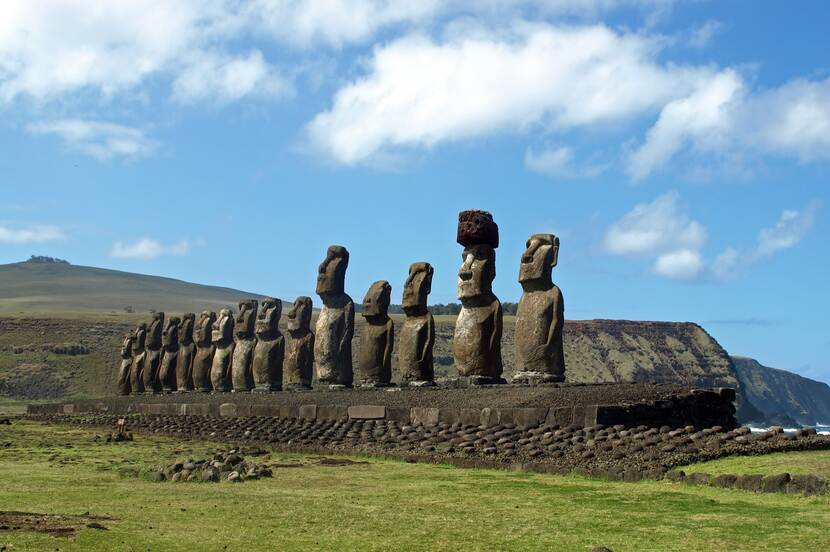Three Dutch research projects on cultural heritage and climate change receive international funding
Sixteen international research proposals will be financed to conduct research at the interface between cultural heritage and climate change. Three of these projects involve Dutch researchers. Researchers were invited to submit proposals for research on the impact of climate change on cultural heritage, and on opportunities for climate adaptation, mitigation and sustainable development through knowledge of cultural heritage. The sixteen winning projects will receive funding of about 14,6 million euro in total.
In light of global developments, the protection and preservation of cultural heritage is of great importance. This requires research across national borders. Joint Programming Initiative Cultural Heritage and Global Change (JPICH) encourages cooperation between national and international research groups in the field of cultural heritage. For the urgent and expansive theme climate change, several financers started a collaboration. This resulted in the first joint call of JPICH, the Joint Programming Initiative Connecting Climate Knowledge for Europe (JPI Climate) and the Belmont Forum. This call encourages trans-disciplinary research at the intersection of cultural heritage and climate change, promotes cooperation of the research community in different regions, and contributes to knowledge development on heritage and climate policy at a global level.
The Netherlands contributes €850,000 to this call. That contribution will be divided among the three projects in which Dutch researchers are participating. Information on the awarded projects with Dutch contributions is given below. All projects receiving funding within this call can be found on Heritage Research Hub.

Projects with Dutch involvement
Dutch researchers participate in three projects: Cultural Heritage in Motion: Indigenous Knowledge and Mobile Livelihoods in Changing Climates (CuHeMo), Real Versus Digital: Sustainability optimization for cultural heritage preservation in national libraries (ReVerDi) and Socio-Ecological Archiving: Coastal Communities’ Heritage in times of climate change (SEA-CCHANGE).
About JPI Cultural Heritage & Global Change
For the Kingdom of the Netherlands, the Dutch Research Council (NWO) and the Cultural Heritage Agency of the Netherlands (RCE) (on behalf of the Ministry of Education, Culture and Science) participate in JPICH Together, NWO and RCE contribute to the organisation, strategy and working methods of JPICH.
Project Cultural Heritage in Motion: Indigenous knowledge and Mobile livelihoods in Changing Climates (CuHeMo)
Project lead: Dr. Ingrid Boas, Wageningen University and Research
Project partners: University of Vienna, Mahidol University Thailand
Consortium: Deltares; Vienna Institute for International Dialogue and Cooperation; University of Mamadou Mahtar Mbow, Senegal; Horn of Africa Regional Environment Center and Network, Ethiopia; Environmental Policy Group Wageningen University and Research; Double Blind Media, USA; Centre de Recherce – Technologies Intermediaires de Peche, Senegal; Andaman Sea Gypsies Association, Thailand.
CuHeMo examines the role that cultural heritage plays in climate change adaptation, drawing from climate sciences, social sciences, and indigenous ways of knowing. We focus on indigenous groups whose livelihoods have historically been mobile, specifically pastoralists and fishery communities in Thailand, Ethiopia and Senegal. In researching this, CuHeMo offers a transdisciplinary perspective bringing together climate scientists, social scientists and indigenous knowledge holders. CuHeMo will do this for a diversity of climate parameters and geographical spaces, through in-depth yet comparative case-studies. This integrative assessment of climate-cultural risk will include attention to the ways in which largescale and place-based sustainability projects may hinder the mobile practices of indigenous cultural heritage. Through participative methodologies and knowledge utilization activities, findings will contribute to mainstream policy debates concerning climate adaptation and mobile cultures.
Real Versus Digital: Sustainability Optimization for cultural heritage preservation in national libraries (ReVerDi)
Project lead: Prof. dr. Uta Pottgiesser, TU Delft
Project partners: Bern University of Applied Sciences, University of Surrey
Consortium: Koninklijke Bibliotheek Nederland; British Library; Schweizerische National Bibliothek; CH Open Source Business Community, Bern; Digital Impact Network, Bern; Docomomo International, Delft; Parliamentary Group Digital Sustainability, Bern.
National libraries have been running projects to digitize their collections for years. Due to rising energy use and cost of digital infrastructures, there is increasing pressure on libraries to reduce their energy use and emissions whilst ensuring maximum usability and accessibility. It is necessary to find an optimal mix of infrastructures that is economically viable, meets legal, academic and cultural requirements, simplifies user access, minimizes energy use and emissions. The ReVerDi project applies the Life Cycle Sustainability Assessment approach to assess these infrastructures from an environmental, social-cultural and economic perspective. It thereby provides the scientific basis required for national libraries and other GLAM institutions to create future-proof infrastructures.
Socio-Ecological Archiving: Coastal Communities’ Heritage in times of climate change (SEA-CCHange)
Project lead: Dr. Annisa Triyanti, Universiteit Utrecht
Project partners: Caring Conservation, Dublin, Newcastle University
Consortium: Rijksdienst voor het Cultureel Erfgoed; Wageningen University and Research, Newcastle University; Carrig Conservation, Dublin; Coastwatch Europe, Dublin; Indonesian National Research and Innovation Agency, Jakarta; Northumberland Insure Fisheries and Conservation Authority; Trinity College Dublin.
SEA-CCHange aims to explore how coastal communities perceive and adapt to climate change in the context of their cultural heritage and how this can inform climate mitigation and adaptation. In the climate and cultural heritage discussion, diverse narratives and local community heritage are often overlooked, leading to underrepresentation and vulnerable communities being left out of climate policy. SEA-CCHange seeks to change this by examining three critical aspects: 1. Assessing the physical risks posed by climate change to cultural heritage, contrasting these risks with how communities perceive them. 2. Investigating how heritage practices adapt during changing times through discussions and interviews; exploring the tensions and unexpected outcomes that emerge from multiple perspectives. 3. Documenting (in an open access archive) how heritage is lived and practiced during climate change and seeking collaborative solutions that consider what's been lost, changed, valued, and what can be recovered.